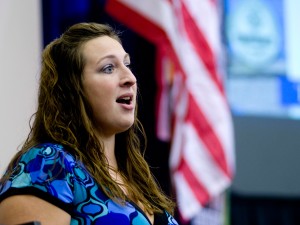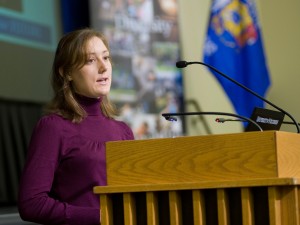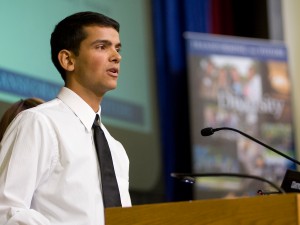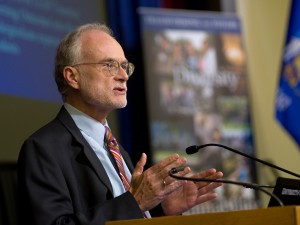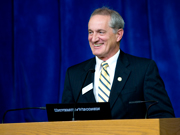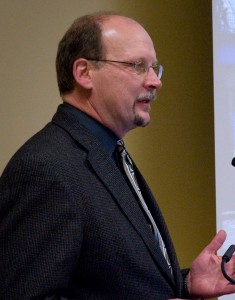EAU CLAIRE – The University of Wisconsin-Eau Claire is taking an active role in shaping the future, said UW-Eau Claire Chancellor Brian Levin-Stankevich, in welcoming the UW System Board of Regents to the campus Thursday.
“Transformation isn’t an abstract idea here. It’s what happens every day,” Levin-Stankevich said.
Outlining the university’s vision of “Transforming Our Future,” Levin-Stankevich pointed to four core principles that drive the campus forward: leadership, innovation, sustainability, and diversity.
To kick off the campus overview, Regents were treated to a stirring vocal performance by UW-Eau Claire senior Rebecca Kidnie – who is also the catcher for the Division III champion BluGold women’s softball team.
“Not all our students are singing athletes,” Levin-Stankevich told the Regents, but Kidnie represents the university’s passionate commitment to liberal arts education.
A variety of presentations gave Regents personal insights into how the campus puts this commitment into action.
In a student presentation on UW-Eau Claire’s carbon emissions inventory project, senior economics major Isaac Borofka-Webb told Regents, “We see how our research is transforming the university’s practices.”
Senior physics major Patrese Hoffman, a student involved with the interdisciplinary Materials Science Center, shared with Regents the satisfaction of making a tangible contribution in internships and outreach with K-12 schools. Hoffman added that time spent with local elementary students has rewards: “I reel them in before they realize they’re not supposed to be interested in science.”
Regents also heard about how study-abroad opportunities can help students grasp “what separates and connects you, me, and us,” as one participant described it. Finally, student recollections and a video let Regents share in another group of students’ civil rights pilgrimage in the American deep South.
Regent Judy Crain complimented the students and their faculty advisers on the range and depth of their presentations. “You not only informed us but moved us,” she said.
Give Students a Compass initiative showcased
The full Board heard a presentation on . This initiative is one of the UW System’s signature projects in its collaboration with the Association of American Colleges & Universities (AAC&U) on the LEAP Campaign (Liberal Education and America’s Promise).
Rebecca Martin, Senior Vice President for Academic Affairs, told Regents that in its focus on curricular reform for those students who have been historically underserved by higher education, the Compass Project is also a model for Inclusive Excellence, a major priority of the UW System’s Growth Agenda for Wisconsin.
“It is about leveling the playing field, and redefining excellence to include diversity and equity,” Martin said. “With our partners at AAC&U and the Cal State and Oregon University Systems, we are working to help America’s extraordinarily diverse students reap the full benefits of their studies in college – benefits that are economic, civic and personal.”
The initiative focuses on High Impact Practices (or HIPs) to help UW institutions make good on their commitment to the Shared Learning Goals, that is, the knowledge, skills, abilities, and habits of mind that all UW students ideally should graduate with to fully participate in the 21st-century global society. These practices include learning communities, writing-intensive courses, diversity and global learning experiences, internships, and other practices.
“If these learning outcomes are our goals, then how we organize and structure the curricular, co-curricular, and pedagogical experiences for our students warrant our deepest attention,” Martin said.
Regents heard from team leaders at three pilot sites for the grant program: UW-Eau Claire, UW-Milwaukee, and UW-Oshkosh.
“We’re working towards reformulating general education in terms of outcomes …that means thinking in terms of outcomes that cross interdisciplinary lines, not just learning more in different disciplines,” said Jeffrey Merrick, UW-Milwaukee’s Associate Dean of Humanities and Communication. “It’s about how to think in ways that are transforming not just what you know about this or that subject, and in doing that work to make sure that all of our students have equal access.”
Martin added that a continuing challenge is to address why it is that the students who need HIPs the most often tend to have the least access to such practices.
“We are about the continuous improvement in the core of what we do,” said UW System President Kevin Reilly. “And we know that links directly to one of our really large social commitments, how do we get more students well educated…and on to success in life.”
Education Committee
Report on Remedial Education:
Associate Vice President Sharon Wilhelm told the Education Committee that remediation works, to the extent that students who are identified as needing remediation and who successfully complete remedial courses are retained to the second year at rates comparable to students not needing remediation.
During the three-year period covered in the 2009 report on Remedial Education in the UW System, the percentage of new freshmen who were required to take Math remediation increased from 17.0 percent to 21.3 percent. During the same time period, the percentage of students who needed English remediation decreased slightly, from 7.8 percent to 6.7 percent.
“It’s our responsibility to meet the students we admit where they are and move them forward,” Rebecca Martin, Senior Vice President for Academic Affairs, said of the institutions’ efforts in the area of remedial education.
The UW System is involved in a variety of initiatives working to increase the readiness of both incoming and current students for college-level work. Some of these initiatives – like theKnowHow2GO Network and the Collaboration with the PK-12 Community to Enrich College Preparation in Math – are part of the UW System’s Growth Agenda for Wisconsin.
Other efforts include the UW System’s participating in Making Opportunity Affordable (MOA) and the American Diploma Project.
The Provosts from UW-Green Bay, UW-Whitewater and UW Colleges talked about the variety of approaches they use on their campuses to enhance remedial education efforts. Initiatives highlighted ranged from professional development for faculty at UW Colleges who teach remedial classes, to intensive seven-week remedial math courses at UW-Green Bay, to bridge programs at UW-Whitewater that help students in remedial courses identify and pursue career their goals.
Committee members noted the importance of working with K-12 educators. They also discussed the need for campuses to share information about successful programs so the UW System can begin identifying “best practices” models.
Regents hear two academic plans
The Education Committee was presented with two campus academic plans, one from host campus UW-Eau Claire, and the other from UW-Superior.
UW-Eau Claire Provost Patricia Kleine told committee members that the university is building on its longstanding tradition of providing its students with quality liberal arts education.
“UW-Eau Claire now stands ready to assert its position as one of the premier public institutions of liberal education in the Upper Midwest, both by building on current success, and by rededicating all aspects of the institution for a more focused, evidence-based future,” Kleine said.
Kleine said UW-Eau Claire is at the center of a “perfect storm” in terms of self-study and change. This fall, UW-Eau Claire completed its comprehensive self-study for the Higher Learning Commission. In 2008, it developed its Centennial Plan (2016 will be UW-Eau Claire’s centennial anniversary), a plan that includes several strategic goals that aim to make the university a connected, transformative, globally relevant and equitable campus. The university recently completed a quality improvement assessment that resulted in more than 70 recommendations for change across the campus.
“The biggest challenge will be moving the university along a continuous goal of evidence-based practice, balancing what can be offered with the assurance that what we do is quality,” Kleine said.
While technology will continue to increase in importance on the campus, the university will continue human interactions
“UW-Eau Claire will not be just high-tech, but high-tech enabled high-touch,” Kleine said. “UW-Eau Claire will continue to be a place for making human connections — to make meaning, to understand, and to offer perspective — in addition to preparing for a career.”
UW-Superior Provost Christopher Markwood told the committee that he asked the Faculty Senate to take the lead on creating the academic plan for their campus, an effort that they full embraced. Laura Jacobs, associate professor of library science and a member of the UW-Superior Faculty Senate leadership team, joined Markwood at the meeting.
The UW-Superior academic plan emphasizes the university’s longstanding student-focus, Jacobs said.
UW-Superior has identified five liberal arts initiatives that are infused throughout the student experience: academic service-learning, first-year experience, global awareness, senior experience, and writing across the curriculum. The university has strong and varied outreach programs and partnership programs, with programs ranging from those that address water quality to diversity programs that involve the Native American communities.
UW-Superior houses two nationally recognized research centers: the Lake Superior Research Institute and the Transportation and Logistics Research Center. It also is planning for two additional projects that will increase the number of opportunities for collaborative research: the Lake Superior National Estuarine Research Reserve and the Superior Research Institute.
In other business, the Education Committee:
- Identified its priorities for the upcoming year, including LEAP Wisconsin; Inclusive Excellence, the umbrella framework under which the UW System and its institutions will strategically address equity, diversity and inclusion; teacher quality and the UW System’s Teacher Education Programs; accountability reporting; and the role of the comprehensives in discharging the Research-to-Jobs Task Force;
- Approved UW-La Crosse’s revised mission;
- Approved the B. A. in Latin American, Caribbean, and U.S. Latino Studies at UW-Milwaukee; and
- Approved the B.S. in Applied Social Science at UW-Stout.
Business, Finance and Audit Committee
“BluGold Commitment” is introduced
UW-Eau Claire Chancellor Brian Levin-Stankevich led an informational presentation introducing Regents to the “BluGold Commitment,” a plan to speed up graduation times, provide additional financial aid resources and more learning opportunities outside the classroom.
The overall intent is to sustain and expand UW-Eau Claire’s offerings and the value of its degrees both for current students and those in the future, Levin-Stankevich said.
“In an era of decreasing investments in public higher education … there aren’t enough resources to fulfill our strategic plan, and that’s where the BluGold Commitment comes in,” Levin-Stankevich said.
While no specific funding levels were presented today, campus leaders have previously suggested that differential tuition could be used to fund the new initiatives. Such a funding model would require Regent approval. UW-Eau Claire student leaders participating in the presentation described ongoing efforts to educate students about the plan and gather feedback. Several Regents reiterated that student support would be a critical part of any future approval.
Levin-Stankevich told Regents that additional need-based financial aid clearly would be required to offset tuition increases for needy students, and that the UW-Eau Claire Foundation is committing to a campaign to help come up with those funds. Regent Michael Falbo reinforced that the Foundation’s commitments in augmenting resources for financial aid must be spelled out as part of the process. A larger discussion on UW System policies on differential tuition is scheduled for the December Board meeting.
Human Resource System (HRS) project updated
In accordance with the Committee’s request for regular monthly briefings on the HRS project, Senior Vice President Thomas Anderes told Regents that new safeguards for the project have been successfully negotiated with Huron Consulting Corp. – the primary consultant on the project – since the last Board meeting.
Among several safeguards negotiated by UW System leaders, Huron agrees to take specific and meaningful action to incentivize key employees to remain at Huron; Huron agrees to pay liquidated damages of $100,000 if Huron is unable to find within 10 days a suitable replacement for a professional who leaves the company; and Huron agrees to pay UW System as liquidated damages 10% of the budget less payments as of the date of such failure to perform.
Anderes also reported on the recent Joint Committee on Information and Policy Technology (JCIPT) hearing, telling Regents that the JCIPT expressed some lingering concerns from the previous incompleted project about accountability and related issues of timing, budget, and process.
The committee was also told that over the next nine months, from October 2009 to June 2010, the HRS Project is in the “build” phase. The average effort will be approximately 24,300 hours per month, including 12,800 hours for UW employees and 11,500 hours for consulting staff.
Future Food Service contract language discussed
Following up on a discussion at the September Board meeting regarding food service contracts at UW-Green Bay, UW System staff presented findings from an extensive review of higher education food services contracts nationwide. That study found that very few institutions require a new food service vendor to retain all employees of a previous outside contractor when there is a change in service providers.
Senior Vice President Tom Anderes pointed out that while the UW System is not party to the labor agreements of contracted food service vendors, there is great interest in the welfare of those individuals who work on UW campuses. To encourage and facilitate the retention of experienced staff from one contractor to another, the UW System Office of Procurement will insert language into future Food Service Requests for Proposals that will require vendors to meet with current employees and provide assurances that employees of the current contractor will have an opportunity to compete for positions with the new contractor.
Regent John Drew asserted that the issue comes down to a balance between vendors’ need for flexibility and fairness for incumbent workers.
In other business, the Business, Finance, and Audit Committee:
- Heard a presentation by UW System Trust Funds Director Doug Hoerr on key changes and implications of Wisconsin’s change from the 35-year-old guidance provided by the Uniform Management of Institutional Funds Act (UMIFA) to new guidance provided through the Uniform Prudent Management of Institutional Funds Act (UPMIFA). These changes were adopted by the State of Wisconsin effective August 4, 2009;
- Heard an update on 2009 proxy season voting results relating to trust funds. According to the report, there were 361 proposals filed related to social issues, with nearly half of them coming to votes. Through the end of June, 174 social issue proposals resulted in shareholder votes, 143 were withdrawn, and 44 were allowed to be omitted by the Securities Exchange Commission;
- Heard a report from Senior Vice President Tom Anderes;
- Accepted seven bequests with a total value of $665,000; and
- Approved an additional two-year contract extension with Gold Country, Inc. for space rental and merchandising rights for UW-Madison Athletics, through June 30, 2016.
Capital Planning & Budget Committee
Associate Vice President David Miller reported that the Building Commission approved about $17 million for projects at its September meeting. The funding breakdown for those projects is $4.7 million in General Fund-supported borrowing, $9.8 million in program revenue, and $2.8 million gift funds.
Miller also updated the committee about progress of UW System’s project delivery recommendations, reporting that, at their September meeting, the building commission supported the introduction of legislation that would incorporate those reforms.
The Committee heard a presentation on UW-Eau Claire’s master-plan process as well as recent and planned capital projects.
Mike Rindo, who as special assistant to the chancellor oversees UW-Eau Claire’s facilities planning and management, said that while UW-Eau Claire often is called Wisconsin’s most beautiful campus because of its scenic natural features – including the Chippewa River that runs through the lower campus, or the 230-acre Putnam Park on campus – those very features present challenges in the master plan process.
While working with the limitations presented by those natural features and the fact that the campus is landlocked within the city of Eau Claire, the university has made progress on plans for a new student center, academic building and children’s center, Rindo said.
We’re preparing for what will represent the most significant phase of construction on this campus in 40 years,” he said, noting that the average age of UW-Eau Claire’s 29 significant buildings is 39 years and the university’s newest academic building is 28 years old.
Beth Hellwig, UW-Eau Claire assistant vice chancellor for student affairs and dean of students, said a redesign of a new 156,000-square-foot student center has been requested due to concerns that the most recent plan would put the facility on a site held sacred by the Native American community. The significance of the site — where a historic tree, the Council Oak, once was the meeting place for Native American tribes — became apparent during planning for the center.
The student-funded student center has a $48.8 million budget. Groundbreaking is anticipated in spring or summer 2010 with completion planned for spring 2012. The current student center then will be deconstructed and transformed into a green space, Hellwig said.
The new UW-Eau Claire academic building was given advance enumeration in the state’s 2009-11 budget and will replace the university’s obsolete Brewer Hall/Campus School facility built 58 years ago, Rindo said. Program analysis for the $44.5 million project — which will house the College of Education and Human Sciences – is nearing completion, Rindo said.
UW-Eau Claire also continues to work collaboratively with stakeholders in the region to find solutions to shared facilities needs, such as a major events center, Rindo said.
UW-Stout overview of Master Plan:
The Committee heard a UW-Stout presentation providing an overview of that university’s Campus Master Plan and recently completed capital projects.
Vice Chancellor Diane Moen and Campus Planner George Acker reported that, after a 1½-year process, UW-Stout recently completed the first master plan in its history. The plan takes into consideration campus flow, future development areas, campus image and sustainability, recreational and athletics land use and physical development plan strategies, Moen said.
Highlights of the master plan include developing UW-Stout’s North Campus to create more student amenities and a more cohesive sense of place for student residents, and expansion of Memorial Student Center and the Sports and Fitness Center.
In other business, the Capital Planning and Budget Committee:
- Approved authorization to enter into a ground lease between the Board of Regents and the Wildlife In Need Center (WINC) to construct a wildlife rehabilitation clinic at the UW-Waukesha Sherman Field Station on Board of Regents land and to grant an easement for shared roadway and turnaround access;
- Approved the purchase of approximately 1.26 acres of property located at 840 South Chestnut Street in Platteville. The acquisition will benefit UW-Platteville and support the Grant County Chestnut Street Realignment and Bridge Replacement Project;
- Approved construction of the UW-Stevens Point North Campus Chiller Project, which will serve 12 student residence halls, DeBot Dining Center, Allen Recreation Center and future GPR-supported buildings in the north part of the campus including the remodeled Maintenance and Material Building and the new Waste Management Center;
- Approved the construction of the Hansen Residence Hall Renovation project at UW-Stevens Point. This project is the third building of a four-building Residence Halls Renovation project that was enumerated in the 2007-09 Capital Budget; and
- Approved an increase for a UW System All Agency Maintenance and Repair project at UW-Oshkosh that will replace a concrete vault and relocate a water main that are a result of unforeseen conditions encountered during construction of the project.
Photo Credit: Bill Hoepner and Rick Mickelson, UW-Eau Claire
The Board of Regents will resume its October 2009 meeting on Friday, October 16, at 9 a.m. in the Davies Center at UW-Eau Claire
Related: Read October 16 (day 2) news summary

